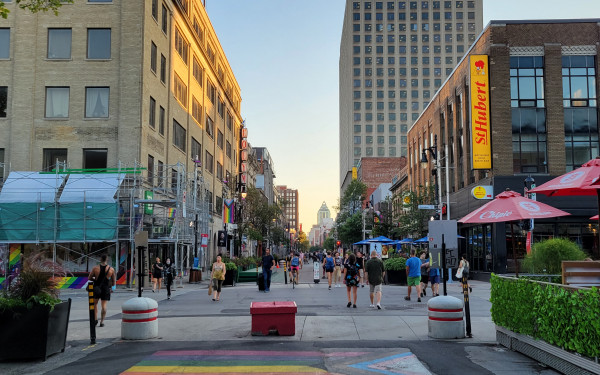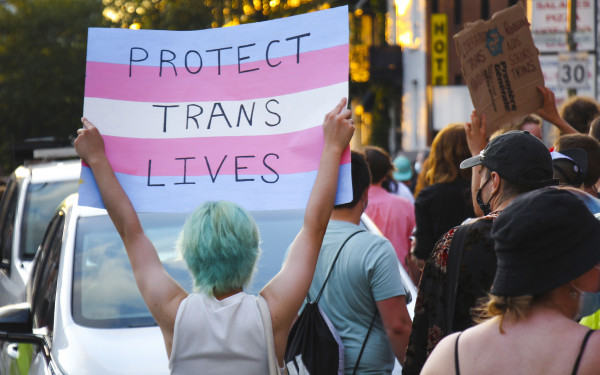That Transexual Guy
Seeking Stability Within the Spectrum of Blue and Pink
“I want to share my transition. I want to write to you about public bathrooms, navigating my name change and taking hormones. I want to tell you about the scary parts, the fun times and share with you the celebrations that come along with transitioning. I want to tell you all of this because I think that it is important that you know about it.”
As I’m writing these words, I’ve been on testosterone for 18 days. Before I began injecting hormones, I never thought much about my body beyond nourishment and sleep. Paying attention to it is a relatively new phenomenon for me.
The pores on my face are deeper and more pronounced. My torso hair may be getting a little darker, but I’m not sure. What hasn’t changed though, is that mental health continues to be a battle.
This is common for trans people. There are all sorts of facts about how trans people have horribly high rates for depression and suicide. I could quote them, but I’d rather explain why.
Looking in the mirror and not being able to connect yourself to the person staring back at you is bewildering, painful and heart-wrenching. It’s terrifying.
Childhood is not idyllic. Trans people often—not always, but often—know that they are ‘different’ from the other kids around them. They know that there is something ‘wrong’ with them.
Sometimes they have the words to express their preferred gender. Sometimes they don’t. Their family members encourage them to follow the rules applicable to the gender they were assigned at birth.
Whether or not the trans person in question agrees is something else entirely. Sometimes the people surrounding the trans child or person are forceful, forcing them to engage in activities or expressions without their consent. They mean well.
Transexual and gender-nonconforming teenagers are only just starting to feel okay about coming out in high school. Rumour has it, anyway. I haven’t met any folks who have come out in high school. I don’t blame them.
I mean, in a country where Catholic school boards won’t allow Ontarian youth to have a Gay-Straight Alliance, why would a trans teenager feel safe coming out in high school?
I have read newspaper articles about gender-nonconforming children—young boys who wear tiaras and princess dresses and parents who raise their children to shop in both sections of the department store. Newspaper articles about gender non-conformance in children. Is this really such a marvel?What happens if you’re in your thirties or forties and decide to transition? You might have a job, a nice house, some kids, a spouse. How will all of that factor in?
Actually, maybe you don’t. You could have a low-paying job and not have the money to access services to transition. What if you’re elderly and trans? How will you tell the nurse who’s helping you out? Will your identity as a trans person be respected in a nursing home?
Looking in the mirror and not being able to connect yourself to the person staring back at you is bewildering, painful, and heart-wrenching. It’s terrifying. I still don’t recognize myself in the mirror. Transitioning is a journey I’m taking in an effort to remedy that.
Look around. How gendered is the area around you?
Are the bathrooms segregated? Are the advertisements aimed at specific genders, such as straight masculine men and straight feminine women? Does the birthday card you get say boy or girl on it?
When you fill out a job application form does it ask you your sex? Do you only shop in the area you’re ‘supposed’ to, even if the clothes on the other side might appeal to you more? Do people call you ‘sir’ or ‘ma’am?’ Have they ever been mistaken?
I won’t bore you with too many questions. Those are just starters. Gender is everywhere. Transexuals know this on a visceral level, and gender-nonconforming folks generally do as well.
Gender is oppressive and frightening. You can get kicked out of bathrooms for looking ‘wrong.’ Hell, it’s not just bathrooms and locker rooms. You can get kicked out of your housing situation, your church, your job. You can get kicked out of your family.
It all depends on whether or not you follow the rules. A variety of factors can effect how you’ll be received as an out trans person: race, class, religion, age, geographical region, etc.
When you transgress gender, it can make people uncomfortable, disagreeable, or violent. Frankly, I don’t give a shit if you’re uncomfortable with my gender.
I am sick of getting adrenaline rushes every time I go into a public bathroom as my body prepares for a fight-or-flight response.
I am exhausted by feeling sucker punched in the gut every time I hear my birth name.
I am fed up with feeling like I have to avoid certain spaces—like my own home, for instance—because I know that my identity will not be acknowledged or respected. All of these contribute to anxiety and depression, both of which I have experienced.
It is not fun. I do not enjoy having to make crisis plans for myself all the time. Trans people should not have to live in a society where their very existence is doubted or denied. Trans people should not have to justify themselves to anyone.
But I do. And so do my trans siblings. Why?
Mostly, it’s to get access to the services that I need as a person to survive. Some trans people, such as myself, need hormones and surgery. Not want. Need.
For some trans folks—but not all—transitioning is a life or death situation. My personal transition is tied to my mental health. Other folks do it for other reasons.
In the introduction to the book Gender Outlaws: The Next Generation, gender theorist and performance artist Kate Bornstein wrote “All I ever wanted to do was be pretty.”
Emphasis on ‘all.’
I have had the desire to do horrible things to myself, but knew that transitioning was the only way that to survive.
I know that other folks have felt the same way. So we’ve found this quality within ourselves—it’s called resilience. Or maybe it’s an unwillingness to cater to people’s bullshit.
Either way, I know that I am not a woman. Regardless of whether or not I wear pink t-shirts or nail polish or dance around my house in colourful underwear, I know that I am not a woman. I am a man, whatever that means to me or you or anybody.
Because I am a man, I have a man’s body and therefore am not trapped in my own body. It just needs some editing. And some tattoos. I really want some of those.
I try really hard not to listen to the people who gender me wrong or who use my birth name.
It’s difficult.
There are days when I approach friends, shaking slightly, to ask for a hug. There are days when I walk in the door to my house and have to suppress sobs from all the pent-up emotions. There are days when I have to whisper to myself that I am a good man, a good person, who is doing the best he can.
On the other end of the spectrum, there are days when I am dandy as Oscar Wilde in a courtroom trial. Misgendering rolls off my personal space faster than a kid on a toboggan sledding down an icy hill. Gender can just get down on its knees and beg to unzip my jeans (but only if it asks nicely).
Trans people fight tooth and nail to have their genders recognized as valid and legitimate.
This is why we can be defensive or angry when faced with inane questions or invasive pat-downs.
We’re touchy because we’ve been poked and prodded so many times that we’ve forgotten how to heal.
So the next time you’re looking at us to get up and go educate, check in first and ask if we feel up to it that day.
I want to thank the two people who got me through my first shot of testosterone.
Thanks to N., for teaching me how to inject and injecting for me when I decided that I didn’t want to do it when I’d never done it before. Thanks to K., for supporting me and holding my hand. I hope that you both enjoyed the lollipops as much as I did.
Navigating this ferociously gendered world in a state of precarious mental health is hard.
Actually, just doing it in general and coming out safe and whole is really hard.
But survival is pretty damn important.
There will come a day when trans people, as a whole, will be able to look up from their survival field guides, drop them and live in a world where we can thrive.
Here are some handy resources to help you or your loved ones resist:
The 2110 Center for Gender Advocacy here in on campus: 2110 Mackay St., 514-848-2424 ex. 7431
Good reminders on self-worth for trans and gender-nonconforming people: binarysubverter.wordpress.com/2010/11/24/trans-101/
Holding On: an article about trans people and integrity: questioningtransphobia.com/?p=3631
The It Gets Better Project, for LGBTQ youth: itgetsbetter.org/
Kate Bornstein’s Blog for Teens, Freaks, and Other Outlaws: katebornstein.typepad.com/
The Icarus Project, radical info on navigating mental health, trans-friendly: theicarusproject.net/
210 Things to Do Instead of Cutting: secrettalk.com/secrets/210-things-to-do-instead-of-cutting/14316931/
Feeling suicidal? The Trevor Project, for LGBTQ youth: 866-488-7386, thetrevorproject.org/
Canadian 24h crisis hotline: 514-723-4000
Online forum for Trans and gender-nonconforming folks—immediate crisis support: lauras-playground.com/chat.htm




_600_375_s_c1.png)


_600_375_90_s_c1.jpg)